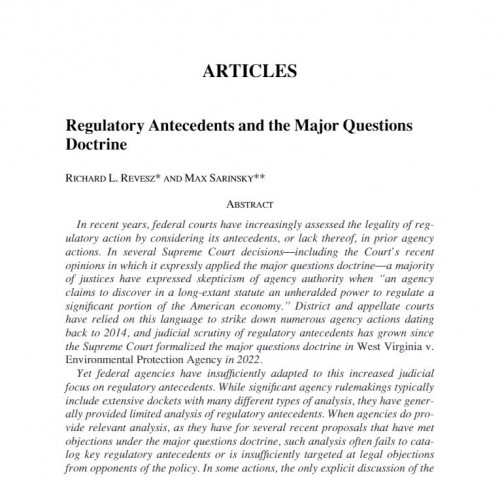-
Regulatory Antecedents and the Major Questions Doctrine
Published in the Georgetown Environmental Law Review
In recent years, federal courts have increasingly assessed the legality of regulatory action by considering its antecedents, or lack thereof, in prior agency actions. Yet as this article explains, federal agencies have insufficiently adapted to this increased judicial focus on regulatory antecedents. While significant agency rulemakings typically include extensive dockets with many different types of analysis, they have generally provided limited analysis of regulatory antecedents. This article suggests that agencies more extensively catalog regulatory antecedents at all stages of the rulemaking process, from drafting to promulgation.
-
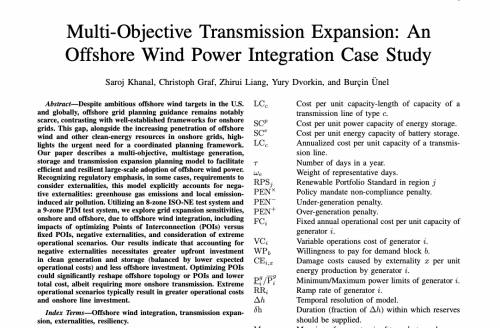
Multi-Objective Transmission Expansion
An Offshore Wind Power Integration Case Study
Our paper describes a multi-objective, multistage generation, storage and transmission expansion planning model to facilitate efficient and resilient large-scale adoption of offshore wind power. Recognizing regulatory emphasis and, in some cases, requirements to consider externalities, this model explicitly accounts for negative externalities: greenhouse gas emissions and local emission-induced air pollution. Our results indicate that accounting for negative externalities necessitates greater upfront investment in clean generation and storage (balanced by lower expected operational costs). Optimizing POIs could significantly reshape offshore topology or POIs, and lower total cost. Finally, accounting for extreme operational scenarios typically results in greater operational costs and sometimes may alter onshore line investment.
-
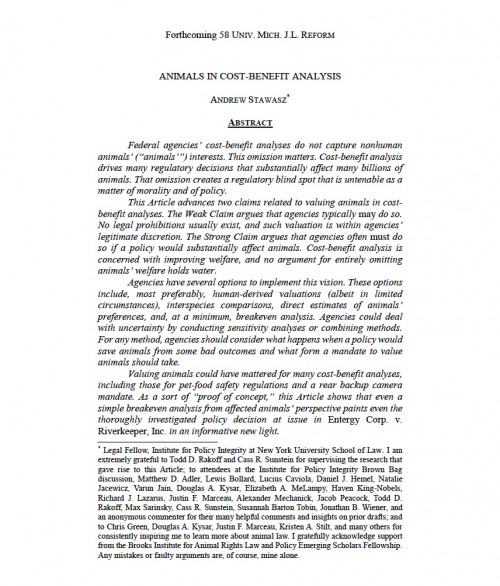
Animals in Cost-Benefit Analysis
Forthcoming in the University of Michigan Journal of Law Reform
Federal agencies’ cost-benefit analyses do not capture nonhuman animals’ interests. This omission matters. Cost-benefit analysis drives many regulatory decisions that substantially affect many billions of animals. That omission creates a regulatory blind spot that is untenable as a matter of morality and of policy. Valuing animals could have mattered for many cost-benefit analyses, including those for pet-food safety regulations and a rear backup camera mandate. As a sort of “proof of concept,” this Article shows that even a simple breakeven analysis from affected animals’ perspective paints even the thoroughly investigated policy decision at issue in Entergy Corp. v. Riverkeeper, Inc. in an informative new light.
-
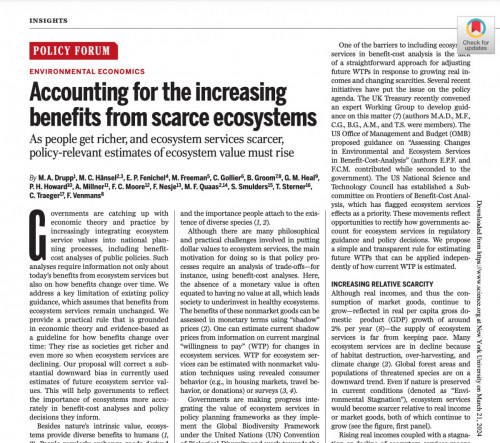
Accounting for the Increasing Benefits From Scarce Ecosystems
As people get richer, and ecosystem services scarcer, policy-relevant estimates of ecosystem value must rise
Governments are catching up with economic theory and practice by increasingly integrating ecosystem service values into national planning processes, including benefit-cost analyses of public policies. Such analyses require information not only about today’s benefits from ecosystem services but also on how benefits change over time. We address a key limitation of existing policy guidance, which assumes that benefits from ecosystem services remain unchanged. We provide a practical rule that is grounded in economic theory and evidence-based as a guideline for how benefits change over time: They rise as societies get richer and even more so when ecosystem services are declining. Our proposal will correct a substantial downward bias in currently used estimates of future ecosystem service values.
-
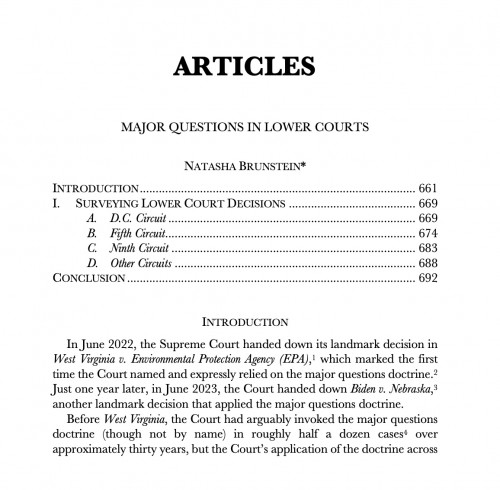
Major Questions in Lower Courts
Published in the Administrative Law Review
In June 2022, the Supreme Court handed down its landmark decision in West Virginia v. Environmental Protection Agency (EPA), which marked the first time the Court named and expressly relied on the major questions doctrine. This Article surveys how lower federal courts have interpreted West Virginia and applied the major questions doctrine. There is no one major questions doctrine in the lower courts. Judges have taken vastly different approaches to defining and applying the doctrine both within and across circuits. These differences illustrate that many judges may view the doctrine as a little more than a grab bag of factors, which they seem to be choosing from at their discretion. Lower court judges do not appear to be constrained in how they apply the doctrine. In a majority of cases concerning Biden Administration agency actions and executive orders, judges applied the doctrine to reach outcomes that aligned with the political party of their appointing President.
Viewing all publications in Academic Articles/Working Papers

